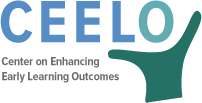The Center on Enhancing Early Learning Outcomes (CEELO) is proud to partner with New America on this blog series highlighting early learning opportunities and challenges under the Every Student Succeeds Act (ESSA). In this week’s post, Kafilat Oladiran examines how early social-emotional learning skills are critical for long-term school and life success.
The goal of every school is to help students acquire the skills and tools needed for a successful future. The federal Every Student Succeeds Act (ESSA) provides states and local education agencies with opportunities to improve strategies and practices to better support the academic, developmental, and social-emotional learning that prepares students for college and careers. And while the importance of strong academics is well-known, research now indicates early social-emotional learning (SEL) skills are important elements of school readiness and healthy child development, which are critical for long-term school and life success.
SEL lays the foundation for growth in all areas of development and is especially critical for children living in areas of concentrated poverty. With a focus on SEL in instruction, children are more likely to acquire and learn to effectively exercise the knowledge, attitudes, and skills necessary to understand and manage emotions, set and achieve positive goals, feel and show empathy for others, and establish and maintain positive relationships. Using strategies to develop children’s SEL skills, teachers can provides a safe classroom environment that encourages students to feel comfortable discussing their lives and difficult topics. Studies show that students who are exposed to SEL regularly demonstrate improved academic effort and achievement.
As students continue to build upon their SEL skills throughout their education, research shows they establish characteristics that are both instrumental in college and valuable to employers. They gain interpersonal skills that allow them to work effectively with others and use cooperation and tolerance in social situations and learn how to persevere and work diligently. Engagement in SEL practices such as self-awareness leads to a greater sense of autonomy, accepting responsibility for their actions and learning from past experiences. Students are able to understand their own strengths and weaknesses and create goals for growth and self-improvement. Students also feel comfortable advocating for themselves.
Under ESSA, states can address social-emotional learning across the continuum of learning in PreK-grade 3, an especially important time for the development of strong social-emotional skills. States are able to use funds under Title I and Title II, Part A for a variety of different social and emotional strategies, including in-service training for school personnel about techniques and supports for SEL, such as referring at-risk students to mental health services, and addressing issues like safety, peer interaction, drug and alcohol abuse, and chronic absenteeism. Nevada’s ESSA plan, for example, includes supporting school districts and charter schools with funds to contract with social workers or other mental health workers to support social emotional learning and treatment services to students and families who are struggling with poverty, behavioral health concerns, or overcoming trauma. Massachusetts’ ESSA plan notes their involvement in the Collaborating States Initiative facilitated by the Collaborative for Academic, Social, and Emotional Learning (CASEL), to update and expand guidelines for implementing SEL curricula, and explore ways to incorporate SEL into the Massachusetts curriculum frameworks.
ESSA has as its central goal to support every child to succeed and attention to the social and emotional health of students in the early years of school is vital to this goal. Teachers play a sizable role in developing students’ beliefs about their intellectual capacity, their sense of belonging in school and the world, their eagerness to learn in the face of adversity, and their strategies for academic and lifelong success by enhancing SEL practices. With ESSA, states can support schools in refocusing on the academic and social-emotional side of student achievement.
For further information on ESSA see CEELO’s ESSA webpage and New America’s Early and Elementary Education Team’s ESSA webpage.
Kafilat Oladiran is a rising senior at Bucknell University, majoring in Education and Sociology with a minor in Public Policy. She is working as a summer intern at CEELO.

